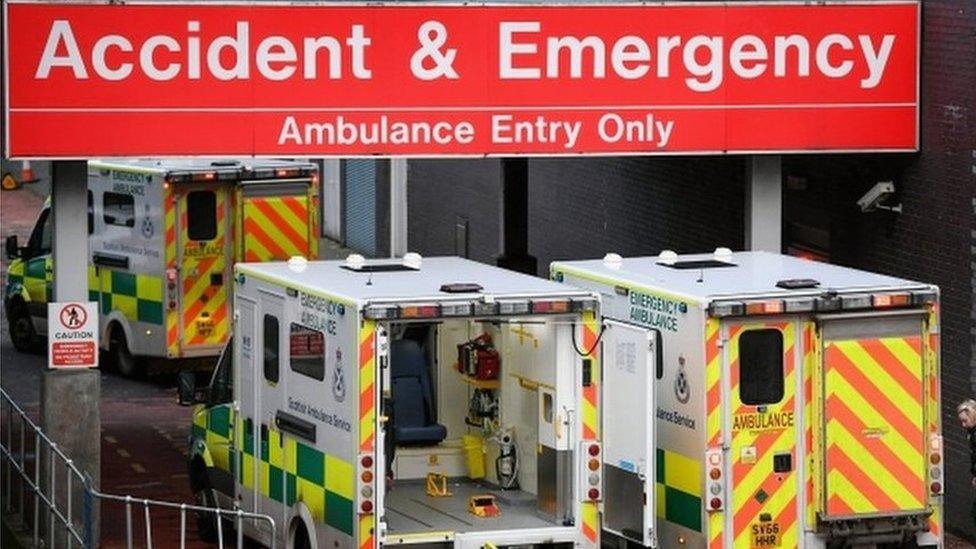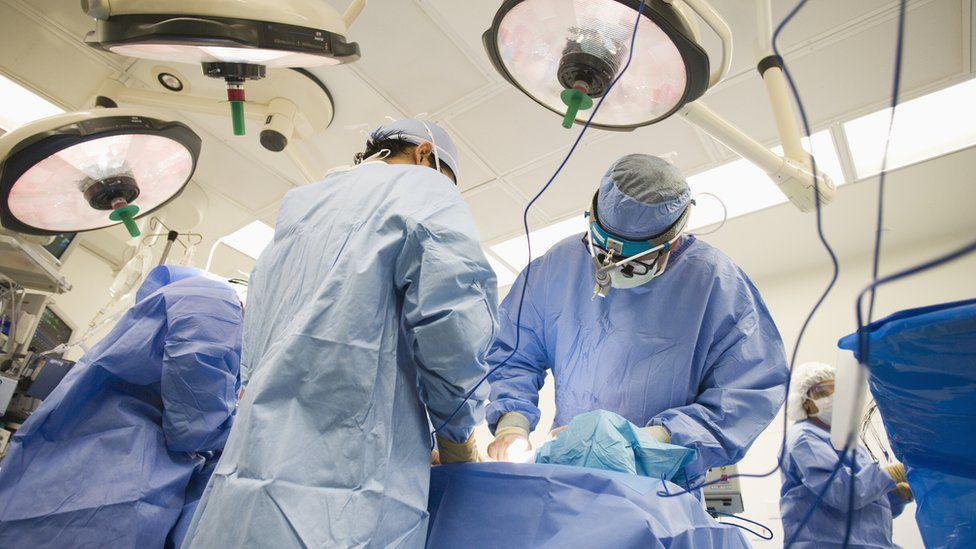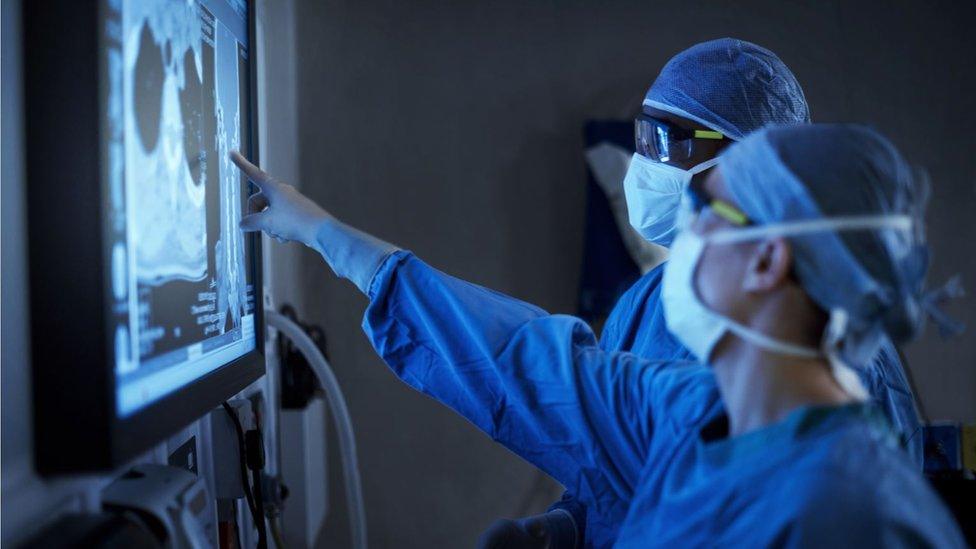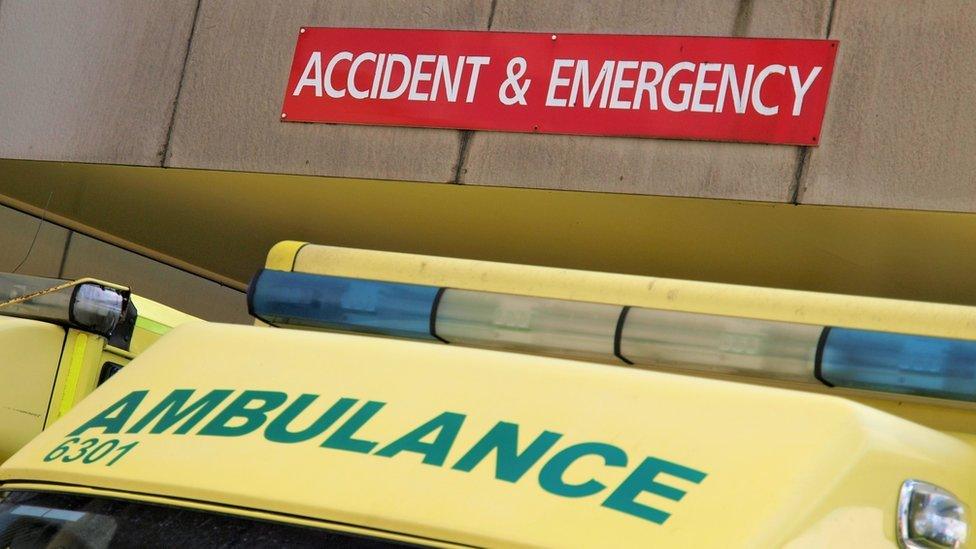Hospital pressures: 'Lives being lost as patient queues lengthen'
- Published
- comments

Lives are being lost across Northern Ireland because emergency departments are unable to cope with rising numbers.
That is according to the Royal College of Emergency Medicine which said this winter will be tough for patients and staff.
Its vice-president, Dr Paul Kerr, told BBC News NI that patients are queuing for beds and waiting in corridors.
Health Minister Robin Swann said he was "keenly aware of the pressures being felt".
Earlier, the Royal College of Surgeons warned that planned surgeries in Northern Ireland could be cancelled in the coming weeks.
"We know that people are having to wait for a very long time at the most vulnerable time in their lives, they are coming to hospital and lying on trolleys sometimes for days and lives are being lost," Dr Kerr added.
Waiting times are already reaching those similar to what is reported in winter.
Trusts have been appealing for help over the last 24 hours with emergency departments under severe pressure.
It comes as political and health officials call for a functioning Northern Ireland Executive to tackle the ongoing health crisis.
Unison said the "relentless" situation was "completely unsustainable".
Mark Taylor, from the Royal College of Surgeons, told BBC's Good Morning Ulster that the current situation had became "just the usual".
"This has been unrelenting. Winter pressures came many, many months ago, at a time when we would have had the normal lull in emergency admissions," he said.

The Royal College of Surgeons has warned that planned surgeries in Northern Ireland could be cancelled in the coming weeks.
"The difficulty for me, from the Royal College of Surgeons, is it will mean elective [planned] surgery will stop because that's what happens every year, in winter.
"One of the reasons we have called repeatedly for the separation of emergency and elective is for this very reason.
"It will not be surprising if we're cancelling elective surgery in the coming weeks."
Mr Taylor said there are currently 124,917 patients waiting for surgery in Northern Ireland and they are presenting in emergency departments as a "journey of their illness".
He called on political leaders to form an executive to tackle the ongoing health crisis.
"It requires a collective approach, we have said it repeatedly that you need a functioning government, you need all people willing to make the changes that are needed," he said.
Unison representative James Large said his members were "feeling the strain" across the entire healthcare system.
He told Good Morning Ulster: "It's just become completely unsustainable for our members who haven't had a break, it's been relentless over the last two-and-a-half, three years.
"I think it's a bit disingenuous to call it winter pressures because it's all year round pressure, it just doesn't go away and it's gradually getting worse with each passing day."
He called for a functioning executive, adding spiralling food and fuel costs would contribute to hospital admissions this winter.
The Stormont executive is not sitting due to the DUP's ongoing opposition over the NI Protocol, the post-Brexit trading deal.

Pressures faced by the health service are now a perennial issue, Alliance assembly member Paula Bradshaw told BBC Radio Foyle.
Ms Bradshaw says she hopes an action plan from the Department for Health can help address some of the issues.
"There's no doubt that it's not even a winter pressure issue anymore," she said.
"They made an appeal in July, they were appeals made last March and January - it is perennial issue now."
Robin Swann said the health and social care service was "focused on increasing levels of activity after the pandemic" and would be "mobilising available capacity" to mitigate winter pressures.
"It is important to be honest with the public - these problems are long-standing and there is no quick fix," he said.
He added that efforts to increase capacity through investment in people and technology had been hampered by the absence of a Northern Ireland Executive and the "significant projected overspend" facing his department.
Sinn Féin's Colm Gildernew said an executive must be formed urgently to bolster the struggling health service.
"It is reflected in the emergency departments but it is a result of a lack of workforce right across the system," he said.
"Staff are under too much pressure for far too long and a lack of implementation and investment in retention and recruitment of staff."
Democratic Unionist Party (DUP) assembly member Pam Cameron said the problems "won't magically disappear" once the executive is formed.
"Obviously the challenges facing the health service haven't developed over the last months, certainly not over the last six months," Ms Cameron said.
"They won't magically disappear when we can form an executive.
"It is going to take a long-term strategic plan for our health service and that is something that we want to see."
Related topics
- Published4 October 2022

- Published30 June 2022

- Published10 March 2022
